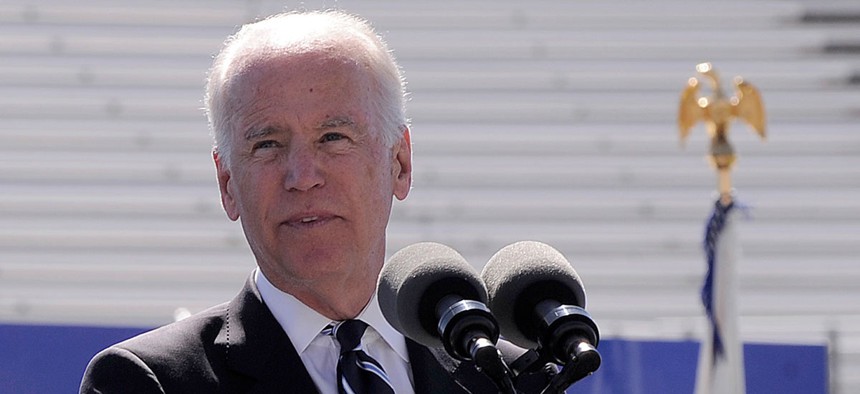
Sarah Chambers/Air Force file photo
Joe Biden’s New Memoir Shows a Person Coping With Work Under Extreme Emotional Stress
"Promise Me, Dad" is out this week.
“Uncle Joe” Biden is no joke. In a poignant new memoir, the much-memed former US vice president is a man bursting with grief as he tries to help run the country.
Promise Me, Dad is out this week (Nov. 14) from Flatiron Books, an imprint of Macmillan. In it, Biden recounts the trying months in which his son Beau battled brain cancer and ultimately lost, dying at 46 in 2015. Biden was a popular figure of goofy chillness during Barack Obama’s presidency, and he’s also a rumored contender for the Democratic presidential nominee in 2020. But here he’s a devastated father going to work under extreme emotional duress.

Pete Souza/White House file photo
The memoir begins in November 2014 with an already weakened Beau Biden, and ends after he dies in May 2015. It wasn’t the first major loss for Biden. In 1972, his then wife, Neilia Hunter, and one-year-old daughter, Naomi, died in a car crash. In his new memoir Biden comes across as a resilient family man who is spurred deeper into his political life and civic responsibility as a result of his grief, not in spite of it.
What’s remarkable about the passages—and what sometimes causes dissonance for the reader—is Biden’s frequent oscillations between the deeply personal and the high-stakes professional. In one breath, Biden describes one of his last moments with Beau, his son in a wheelchair watching the sunset with his parents, and updates the reader on the escalating conflict between Ukraine and Russia. Throughout the book, taxing Biden family hospital visits are peppered with calls to Ukrainian president Petro Poroshenko and memorial services for other lost Americans.
An apparent genius for compartmentalization enabled Biden to work as his son’s health crumbled. Two weeks after his son died, Biden wrote in his diary:
Good day in that I was busy and was able to have some relief. … Still not believable to me that Beau is gone. I feel his presence as much as I did when he was in Iraq for a year. I know if I’m unable to compartmentalize I’ll go nuts. I can hear him saying, “Now, Dad, I’m all right. It’s all good. All good, Dad.”
The former vice president reflects that it was often in times of bad odds that his family tended to band together around a common professional purpose—like, maybe, a presidential run. Biden had started planning for a run in 2013.
In the weeks after his son’s death, pressure from the Democratic party mounted for him to say whether he’d pursue a nomination. After a story ran in Politico arguing that Biden’s grief was calculatedto make him appear like a more sympathetic candidate, Biden writes that he became enraged. He realized then that the balance between work and life that had seemed to drive him before, had now become tipped dramatically toward the personal. His anger about the article gave him pause:
I understood the danger of that, especially in my present emotional state. If this thing about Beau came up somewhere in my hearing, I was afraid I would not be able to control my rage. And I would say or do something I would regret.
Promise Me, Dad ends on Biden’s announcement that he would not seek the party nomination to run for president in 2016. The book leaves open the possibility of a 2020 run, a non-commitment Biden has re-affirmed this week. A cynical reader might say that the book does great marketing for a politician preparing to run for office. But that’s only because Biden comes across so clearly as a relatable, vulnerable person and as a parent trying to fulfill his duty.






